Right in the centre of Warsaw, where there once was the summer residence of royals, now lies a one-of-a-kind symbol of resistance, rebirth and civil consciousness, a settlement of Finnish wooden houses that resist the modern processes of urban development. Open Jazdów is a bottom-up community on its way to become a new, atypical neighbourhood.
Interview with Andrzej Górz and Wojtek Matejko who are among the founders of Open Jazdów.
Open Jazdów is located on the ground of the former Ujazdowski Hospital. The 27 houses, other buildings and adjacent gardens of Open Jazdów have become the living and working environment for the residents, informal groups, urban gardeners, beekeepers, NGOs and creative minds, in addition to embassies and public institutions. The Municipality of Warsaw wanted to tear this place down in order to build new developments right in one of the most expensive areas of the city. This is when the community of Open Jazdów began its adventure. The resistance made it possible for the place to stay and develop itself, and it also showed that things can change positively if there is ”critical mass”.
Open Jazdów hosts the first beekeeping station in Warsaw. The police tried to shut the station down several times, as beekeeping was forbidden in urban settings, but after several months of resistance they were able to keep the activity and the regulation at municipality level eventually changed. Now it is legal to have beekeeping stations in the city and this created a chain reaction that now allows other Polish cities to host beekeeping stations. A further impact of Open Jazdów is that now even the municipality itself started to activate beekeeping stations on the rooftops of some of their premises.
The activities of the place started with six NGOs setting up their office here. The rest came through an open competition initiated by the municipality, but as Open Jazdów were part of the jury, they had the chance to better select the newcomers. To this day, this is the peak of the cooperation level they had with the municipality.
In 2011 the city council wanted to tear the settlement down to use the space for newer developments. In 2012, when the conflict between people living here and the City started, Andrzej (who was born and grew up here) started to create a bottom-up community that could take care of this area and create a new neighbourhood.
How did the opposition to the demolition start?
Andrzej
The opposition officially began when the municipality tore down four houses. This made us feel like we really needed to do something. We managed to engage many NGOs, artists and students to build a huge resistance front. Of course, it still remains an area of great interest in terms of real estate developments, so there must be action taken now in order to protect the park and make it become a protected heritage site for everyone to enjoy. The buildings in the area of Open Jazdów are not protected, only the urban plan is. Therefore, it is more accurate to consider their status as in “semi-protection”. The effective risk is that the municipality may change the heritage protection rules – in legal terms, it would still remain a park, but the city administration could decide to tear buildings down and nothing would forbid them from plopping a McDonald’s or something similar. We oppose this possibility and are doing our best to force the municipality to declare this a protected heritage site.
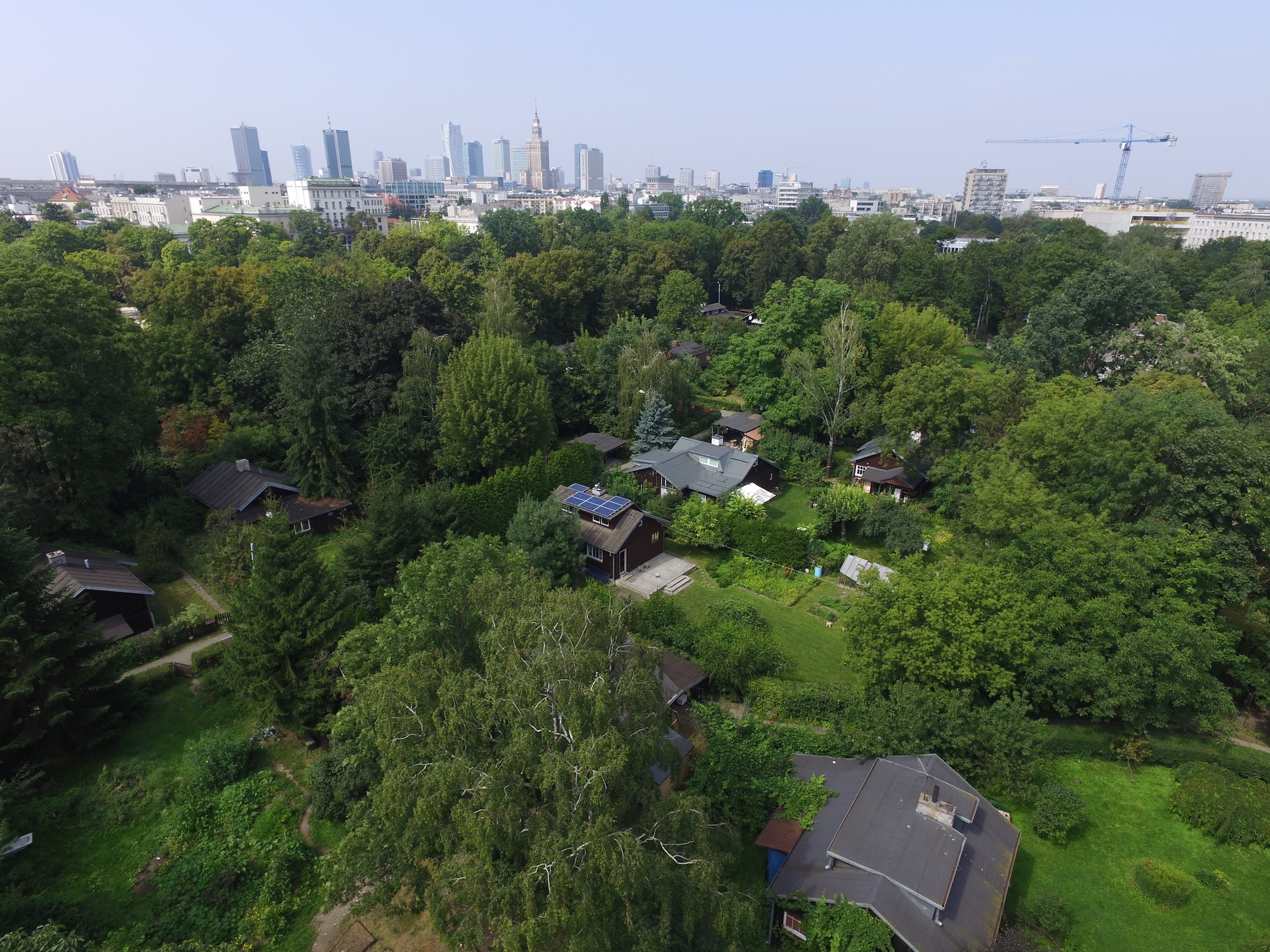
When and why were the wooden houses built?
Wojtek
The houses came from Finland through the USSR in 1945. Warsaw was destroyed during the war, so there was the need to rebuild it, fast. 500 houses were sent to the city, and this area comprised of about a hundred. The difference between Jazdów and other settlements is that here the houses were mainly inhabited by architects and engineers working for the Office for the Reconstruction of Warsaw. At that time everyone thought this place would be temporary, lasting for only five years or so, as the population was expecting a housing boom supported by the new Socialist era. It didn’t work out well, which is why this settlement is still present to this day. Out of the hundred houses that were here, now only 27 are left, and their sizes vary from 60 to 110 square metres.
This place really looked like a village in the centre of Warsaw – people were planting trees and vegetables around the houses – they even had their own farm animals. A community started to develop and new generations came by.
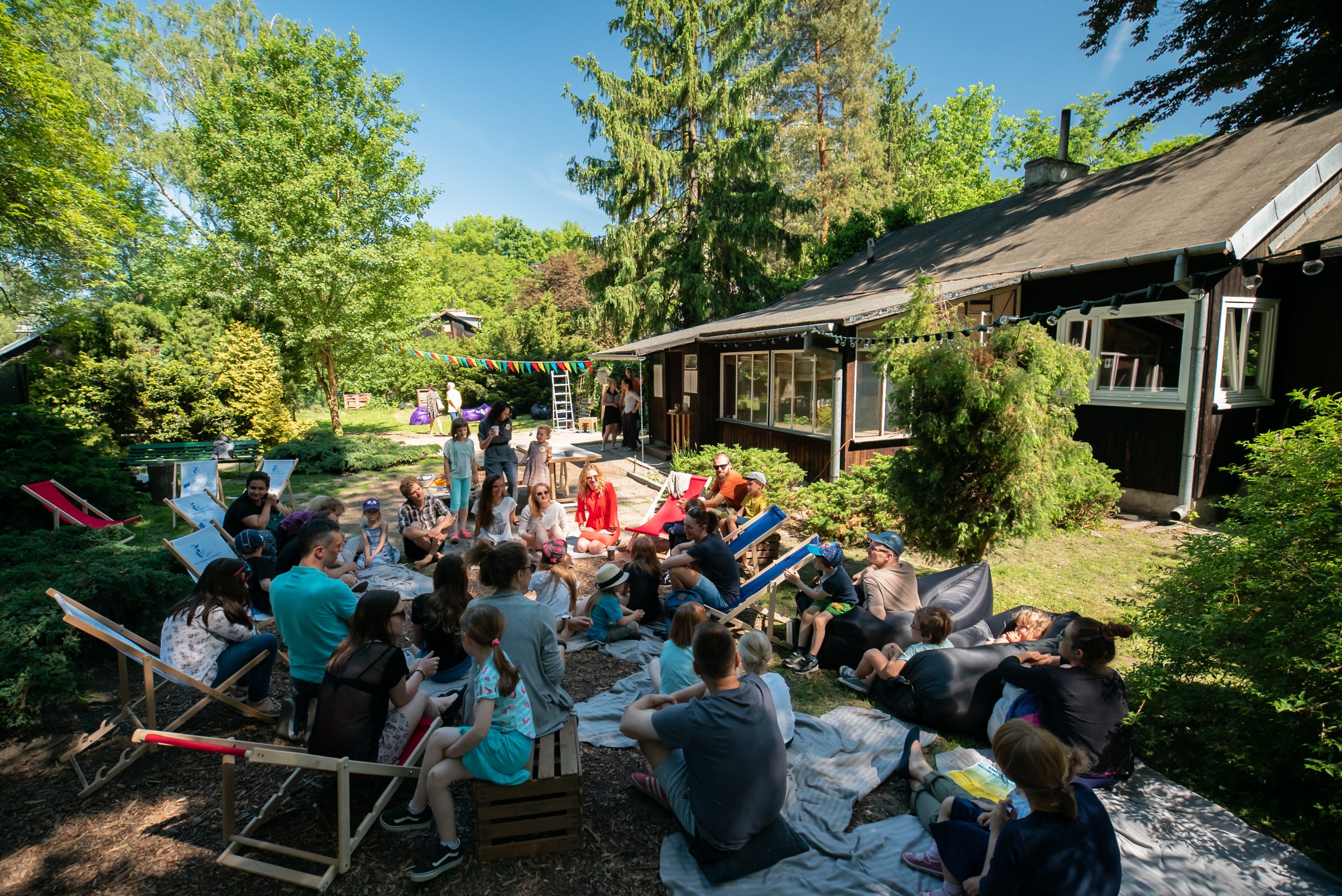
How is the present-day quality of life?
Andrzej
We are in the middle of a huge city, yet practically in the woods in unique, yet run-down houses. Rent is low, yet there is no proper heating and during the winter expenditures rise a lot for keeping the place warm. It will surely become very attractive once we manage to implement a smart system for utilities.
People come living here through a waiting list, reserved for people with lower income. We want residents here because we want to keep this amazing space alive and give it back to the city through their help with park maintenance.
Wojtek
Among the institutions, companies and embassies, one part of the old hospital block still works as a day-time facility for mental health services. Together with Open Jazdów, patients organise events and exhibitions, and they also started to manage their own community garden. Unfortunately, the facility still uses an old, coal-based heating system. This creates problems in terms of the quality of air, so many of us complained about this, yet so far there appears to be no sign of cooperation from institutions.
What about the cultural activities?
Andrzej
The more culturally related activities, such as exhibitions, concerts and projections came in when, at the beginning of the fight against the municipality, lots of activists from the city got together and decided to help us out. The municipality itself gave us permission to use six of these houses for events, as they thought ours would be a one-time request. It wasn’t the case. We used that chance as an experiment to see if it was possible to do something in this area in order to bring it back to life and to prevent it from being demolished. The first festival was held in the summer of 2013, and at that time there were no examples of such initiatives. It was a big success, as the people who took part in these initiatives finally understood the value of the place and felt the urge to have their say in the matter of land repurposing. We started to gather signatures, and managed to start a public consultation process in 2014. This is a good example of how heritage protection could look like if there were direct cooperation between the municipality and the citizens.
What were the results of the consultation process?
Wojtek
It was very clear that this area should be multifunctional and dedicated to educational and cultural purposes, with spaces for NGOs and places where people can live. Becoming an association of associations in 2018 allowed us to officially communicate with the municipality and become a formal local actor. After many efforts, the fact that we are getting housing contracts may be a sign that something is changing at the institutional level – our work and its impact on the community is being acknowledged and fosters our commitment toward the project. Once the Mayor of the district accepted our civic proposal, the city council had to renovate one of the houses, because the project of the House of Culture had been included in the participatory budget of the Central district. Something like this never happened before. This means that, however hard and slow, things are going in a good direction. What is important for us is that anything that will happen to Jazdów will be decided together with the people who live here and with the NGOs who operated in order to keep it active while preventing it from being demolished. We have already been proposed to be moved out while the municipality would invest money on renovations, but we don’t trust this system, partly because even if we were returned the entire area, probably it wouldn’t work like we want it to. So this means we will have to wait longer and keep the discussion going. Another hot topic is energy: the municipality wanted to dig and connect Jazdów to the power grid that is based on coal. Of course, we didn’t like that, as we think that this is the chance for research and experiment. We explained how useful it could be for the city to try and see if we could manage the power demand using renewables or mixed sources, and until the first half of 2020 we will be conducting audits to see what solutions would best fit our situation. The Finnish embassy was also engaged, yet when the conflict with the municipality escalated they stepped back. We finally re-established connections – they helped us publish a handbook about the renovation process, and now we are planning a conference about the story of the wooden houses.
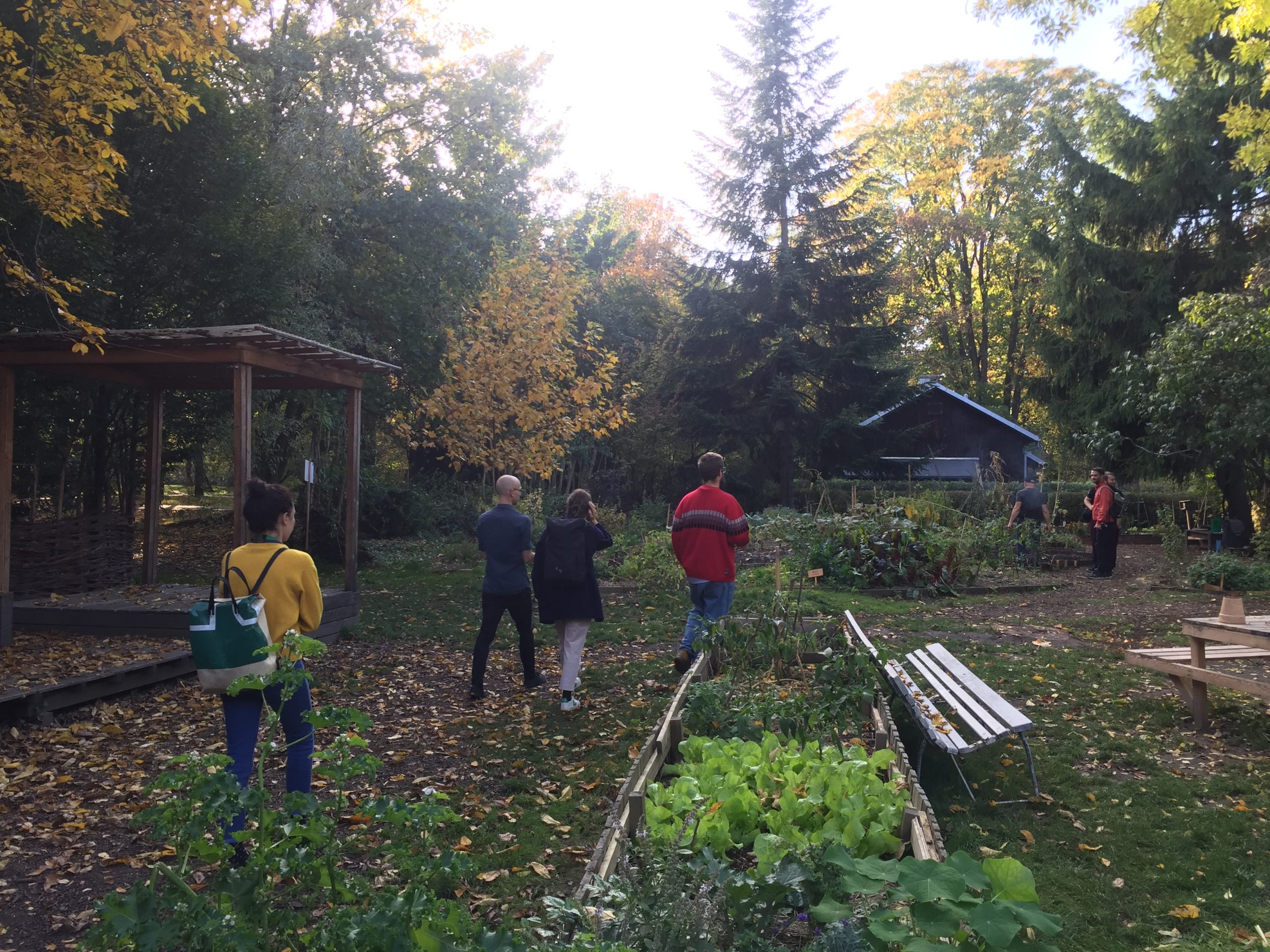
What is the governance structure of Open Jazdów?
Wojtek
Every first Monday of the month the Open Jazdów group (NGOs and residents) meets to discuss about the processes and the present issues of the place. It is a tough job, as the balance is delicate between the NGOs (who push for more programs), the residents (who want less frequent activities) and the whole relationship with the municipality (to better define protection policies and uses for the area).
Andrzej
Working together is not easy. There are 25 NGOs here, in addition to informal groups. Engagement is slow and hard. Thanks to all these people the activities are great, but on the other hand our strength can only be more effective if we are united towards the same goal, thinking about the settlement as a whole, and that’s a hard goal to reach when we are so many. One good example is when we managed to unify rent agreements for NGOs here, the lowest in Warsaw! During 2017 and 2018 we had a coordination team whose responsibility was advocating and representing Jazdów from the outside, but now it’s dissolving because people are burning out. Personal engagement is also a very delicate part: we know it is necessary to involve more people because we cannot make it all by ourselves and none of us is being paid for all the work we are doing in order to revitalise Jazdów.
How do you financially sustain your projects?
Wojtek
Our sources of funding include crowdfunding, ECF (European Cultural Foundation) and, finally, even the Municipality of Warsaw. We started a project called Open University Jazdów using funds from the participatory budget of the Central district. We involved the House of Culture, therefore a public institution, to open yet another channel of communication with the outside world. In the House of Culture anyone can organise events, and rent the for a month or less free of charge.
Andrzej
It is basically our own open budget from public participatory budget. Through this method, we could manage to keep an eye on who proposes activities and projects about Jazdów, and then fund them. Thanks to our sources of funding, we were granted €25,000 in 2018, and used them to support new projects in 2019.
Wojtek
In 2020 the Covid-19 pandemic hit us hard as the regulations really effected our events, and the co-working spaces. The regulations were sometimes difficult to follow and while one type of event in on of our houses was allowed, another type of event in another house was not. Because a lot of our income is from events and donations by visitors, our financial situation has become an issue. So we decided to launch an online fundraiser to target those who regularly visit Open Jazdów. The fundraiser unfortunately only reached 25% of the target. Of course we are very grateful for the amount we fundraised and will use it mostly to make the area safe for visitors and workers, providing masks and disinfectants. Even though there are no events we still have to maintain the cottages and pay rent. The municipality did not offer rent freeze but we managed to get a 15% reduction. We also can apply as an NGO for the government’s anti-crisis shield, while it wouldn’t be much, it will be still some help.
What does Open Jazdów look like now in terms of space?
Andrzej
Up to 2012 there used to be 31 houses. Now 27 houses are left: 16 of them host NGOs, six are inhabited, the city council officially runs two, two houses are empty and one house burned down. In addition to this, there is also a house (not a Finnish wooden one) that hosts a formerly homeless woman. We are waiting for the municipality to give us permission to start rebuilding the house that burned down, yet we already started to raise money. We have a lot of space here, and we want to share most of it. People who came here while looking for places where to organise events loved it, and grew attached to it. There are still people coming here in awe, as many don’t know that this area even exists. The majority of people think it’s just a part of the park.
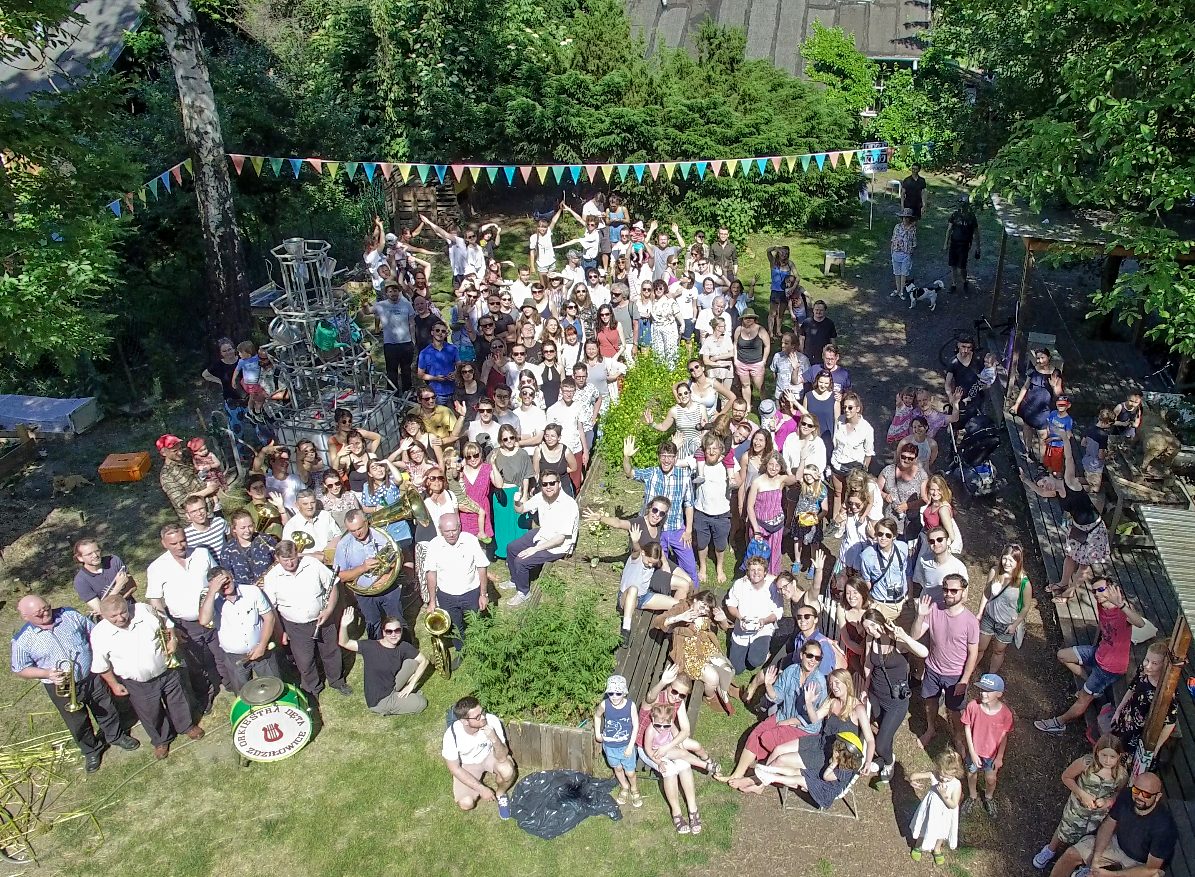
There are also three community gardens, each of them is run by different groups. Everyone pays a small fee for participation (70 zloty, about €18 /month), as the land is rented from the municipality. It’s a very good example of what we want to do with Jazdów. We want to spread this urban gardening agenda around the city – we called it Flourishing Warsaw. This is also related to the fight against climate change, and it follows our principles in terms of sharing common goods.
What do you think you should focus more on?
Wojtek
Definitely conflicts: The residents want more peace and quiet, while NGOs are pushing for more frequent programs. One big conflict we had was with one of the NGOs that was more focused on throwing parties rather than doing more cultural activities – it was just too much, so we had to ask the city council to intervene and remove them from the house, but they didn’t take action. Now they are still here, but don’t run any projects. They occasionally lend the venue to other groups for various activities and sometimes they still throw parties. We need to focus more on consent. Another example is about an NGO that wanted to build a bike parking without asking for permission from the people who lived right in front of it. We definitely understand the issue faced by residents, but at the same time we shouldn’t limit the cultural and social potential of our activities, so dialogue is crucial. As for the relationship with the institutions, we need to work more on the financial aspects: it’s good that we managed to negotiate lower rental fees, yet most renovations costs were not refunded. There are also some private buildings in the area. One of our ideas is to push the municipality to take back the buildings that are not being taken care of, and use them for public purposes.
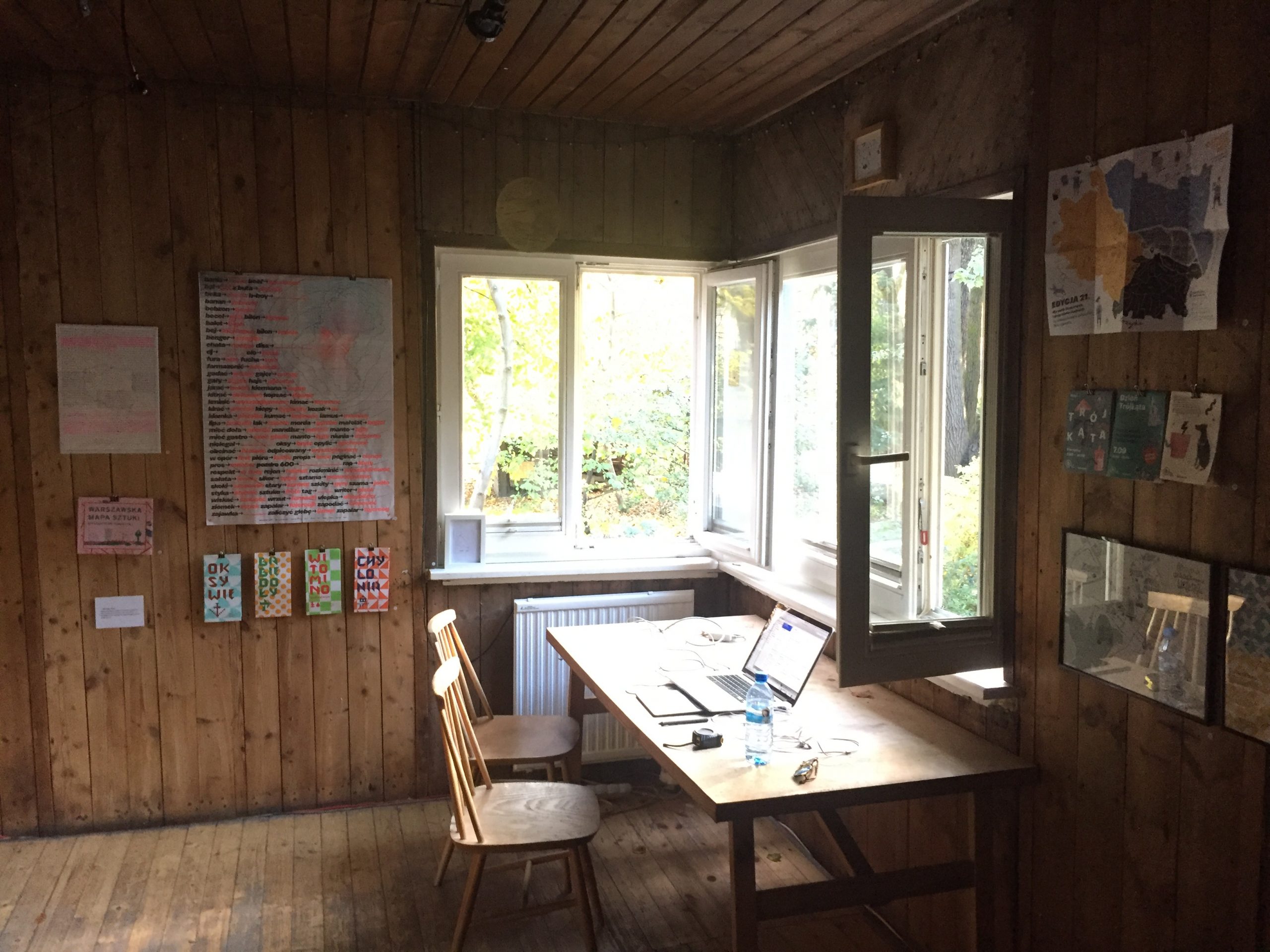
Andrzej
In 2018 we published a 120 pages book about our history, along with the summary of the first two projects we ran (the Community Management Model for the Jazdów Settlement, funded through the European Cultural Foundation, and “Open Neighbourhood. Co-management of urban space in public-social partnership based on the example of the Jazdów housing estate in Warsaw – in collaboration with the Fund for Civil Initiatives of the Ministry of Labour and Social Policy). We are looking forward to publishing newer publications, as we know that more visibility could also mean more help and civic awareness.
The several organisations and informal groups that are present in the project are:
- Jazzdow3przez4 – jazz concerts and jazz education
- Numinosum Foundation – traditional music and dances
- SAWA PW Open Workshop Jazdow – coworking space and architecture studio
- Urban Bees – beehives and beekeeping education
- Common Goods Workshop / Solatorium / Motyka i Słońce – urban gardening and regeneration of common goods
- Państwomiasto (Citystate) – space for social initiatives
- Magical Garden – educational activities and cultural events
- Rotacyjny Dom Kultury – Cultural house, art events
- Embassy of traditional music – traditional folk dances and music
- Bullerbyn Foundation – non-formal education
- Heritage Care Association – Museum of the Reconstruction of Warsaw
- Autonomus Educational Space – anarchist and democratic education
- Extinction Rebellion and Earthstrike – Climate activism movements
- Ladom – experimental music concerts
- International Humanitarian Initiative – migrants rights
- Potwory (monsters) – sports club for kids
- Movie House – cinema education
- Work and Fun Foundation – education for kids
- ZHR – scouting organization
- Art and Social Laboratory – poetry and litearature
- Medow Foundation – green spaces in the cities
- Krzak – urban gardening and art events
- Polish-Finnish Cultural Association
Visit Open Jazdów’s website: https://jazdow.pl/en/


